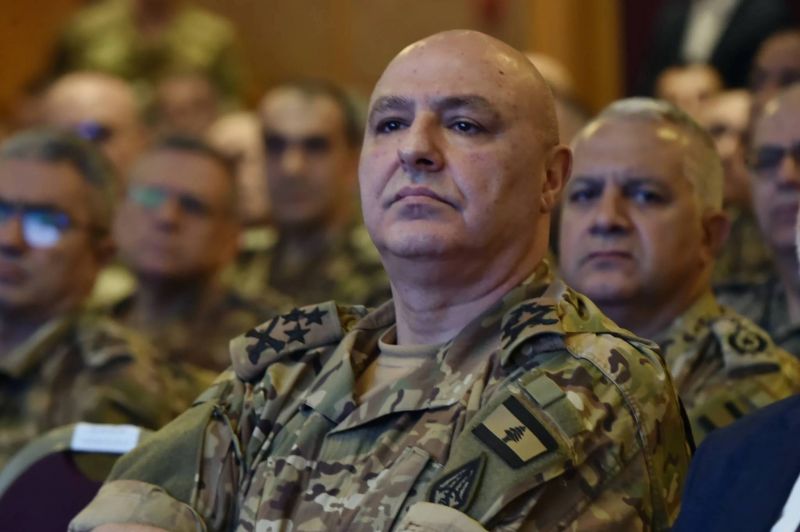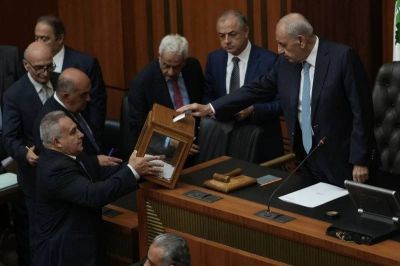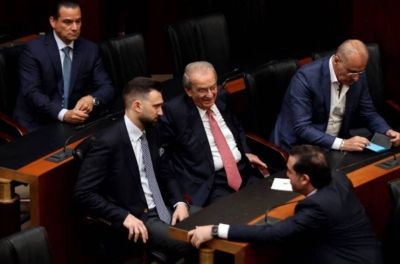
Lebanese army chief Joseph Aoun. (Credit: Hussam Shbaro/File photo)
In diplomacy, nothing is left to chance. While Jean-Yves Le Drian ended his three-day visit to Lebanon in Yarze, it was because he wanted to. The French diplomat’s “mission of consultation and listening” had a very clear objective, which he himself defined on the front steps in Bkirki:
“Emmanuel Macron chose me to carry out with all players the necessary consultations to break the political deadlock immediately.”
In this context, there was no reason for a stopover at the army command headquarters in Yarze. It therefore seems clear that the discussions between the French envoy and army chief did not focus on military issues.
While Le Drian thought it useful to talk to Joseph Aoun before submitting to the French presidency the report on the Lebanese presidential issue, it is because army chief Joseph Aoun is now the main player.
Nor was it by chance that Parliament Speaker Nabih Berri admitted, reluctantly obviously, that Joseph Aoun is Washington’s favorite to succeed Michel Aoun.
“The Americans are not blocking the election and will deal with the president that will be elected, but they are leaning towards the army chief,” a local channel reported him as saying.
This time Berri did not point out that the election of General Aoun requires — unless he decides otherwise, as was the case for Michel Sleiman — an amendment to the Basic Law.
Here too, the timing was well calculated: Jean-Yves Le Drian had just left Ain al-Tineh and was struggling to find common ground between the various players, whom he met in turn without omitting anyone.
Those who are familiar with him are well aware that Berri deliberately put Joseph Aoun’s name on the table.
Why? Firstly, to say that he remains the Americans’ main Shiite interlocutor, even if the Americans sometimes subtly reprimand him, just to call him to order.
Almost simultaneously, the United States, through its ambassador to Lebanon Dorothy Shea, stressed the need to elect a “non-corrupt president who can unite the Lebanese people,” in accordance with the criteria already defined in the French-American-Saudi tripartite statement issued in New York last September.
Secondly, to indicate that the issue was discussed during his meeting with the French envoy — whose mission this time was coordinated and endorsed by the Group of Five (France, United States, Saudi Arabia, Qatar, Egypt) — and perhaps with other local and international interlocutors.
Finally, While Berri dropped the Aoun bomb, it is also to blackmail the person who fears this scenario the most: Free Patriotic Movement (FPM) leader Gebran Bassil. Even Sleiman Frangieh appears to be a lesser evil than Joseph Aoun for Bassil. Or at least, that’s what Berri hopes for.
Bassil’s nightmare
If there is one thing Berri deserves credit for, it is that he has struck at a time when the FPM leader is most vulnerable. By making a deal with the opposition, rallying behind the candidacy of former Finance Minister Jihad Azour to neutralize that of Frangieh, Bassil seems to have fallen into his own trap.
Admittedly, Bassil’s approach has achieved its primary objective, which is to prove that, contrary to what his camp claimed, the Marada leader does not have enough votes to be elected, either in the first or even the second round.
This tactic also served to put Amal and Hezbollah up against a major Christian obstacle and to make Bassil an even more vital need for this camp.
More importantly, Azour’s candidacy weakened the French approach, which was based on the principle that Frangieh was the most “realistic” option, and strengthened the Saudi position, which advocated neutrality. This was in fact the starting point for Le Drian’s mission.
On the other hand, this duel has drastically reduced the two candidates’ chances to be elected, opening the door to what is known as the “third way.” So far, one tends to believe that everything is going according to the calculations of the FPM leader, for whom the agreement with the opposition was merely a maneuver to reveal his true intentions.
Bassil is forgetting, however, that the road to compromise in Lebanon passes, most of the time, through Yarze. He is also forgetting that since the adjournment of the electoral session on June 14, all eyes have been on Joseph Aoun. Starting with Qatar, which has been campaigning for this option from the outset.
It was on his way back from Doha a few days ago that Bassil came to terms with the reality of the situation. “The Qataris want a solution, and Joseph Aoun is among the names proposed. I’m not opposed to it, but I don’t see that he meets the required criteria, particularly as regards the reform program,” he said in a televised interview, before leveraging criticism at the general. Bassil accused him of corruption, while he himself is under US sanctions for the same sin.
Paradoxically, the Bassil-led crusade could end up serving Joseph Aoun well. In any case, it has not damaged his reputation in the eyes of the international community. Foreign aid to support the troops still reaches the chief’s hands, who has managed not only to preserve the only institution still standing but also to wage an all-out war against traffickers, kidnappers and would-be terrorists.
Whether we like him or not, Joseph Aoun has managed to separate politics from security and to make all local players, including Hezbollah, understand that the state is the only king. Despite these unusual guidelines, the army chief has not become persona non grata in the eyes of Hezbollah.
Quite simply because he has not made any “missteps” on strategic issues that the “resistance” care about nor has he “stabbed it in the back.”
When the time comes for a regional compromise, Hezbollah and, behind it, Iran, could sell this card to the Americans, as with the scenario involving the maritime border agreement between Lebanon and Israel.
On that day, Bassil will only have to return to the benches of the opposition to a presidential term supported by the main actors, including his “ally” of the moment, Lebanese Forces Leader Samir Geagea.
Alone, he will no longer be able to block the election, nor maneuver on the line separating the March 14 and March 8 camps. On that day, the ship will have sailed and the FPM leader will not be on board.
This article was originally published in French in L'Orient-Le Jour. Translation by Joelle El Khoury.

